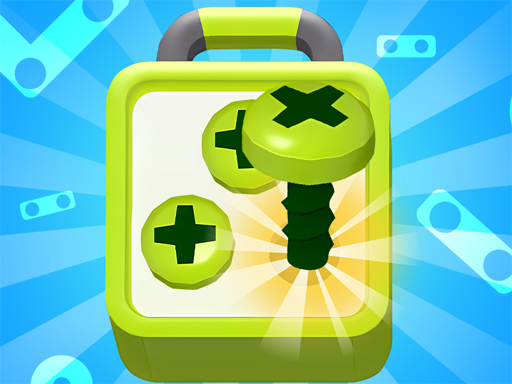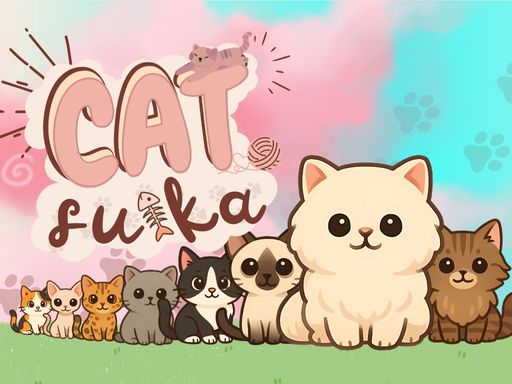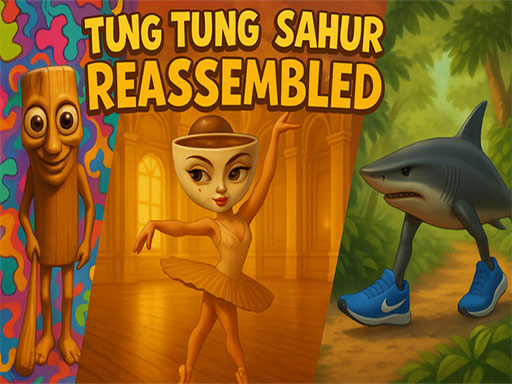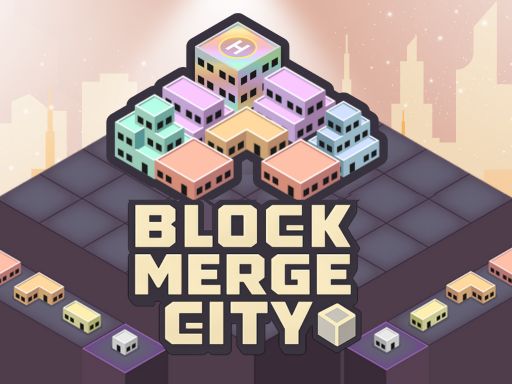Meow-ster Mind
About Meow-ster Mind
Dude, you know how sometimes you stumble across a game, right? Like, you're just scrolling through new releases, maybe looking for something to kill a few hours, and then BAM! Something just *clicks*. It’s not even necessarily the biggest title, or the one with the most hype, but there’s just this… *vibe* about it. That’s exactly what happened to me with Meow-ster Mind, and honestly, I haven't stopped thinking about it since. You absolutely *have* to hear about this.
I mean, at first glance, it looks so deceptively simple. Like, *aggressively* simple. You boot it up, and it’s this adorable little platformer. You’ve got this cute, pixelated cat character, and your goal is pretty standard: jump over gaps, collect shiny things, reach the end of the level. The music is cheerful, the colors are bright, everything just screams "cozy indie platformer for a chill afternoon." And for the first few minutes, that’s exactly what it is. You’re just bopping along, feeling good, maybe even a little nostalgic for those classic 8-bit days. You can almost feel the satisfying *thwack* of your character landing a perfect jump, the little *ping* sound as you snag a collectible. It’s got that immediate, tactile feedback that makes simple platforming so addictive.
But then… something shifts. It’s subtle at first, almost imperceptible. A tiny flicker on the screen, a note in the background music that holds just a fraction of a second too long, a sound effect that echoes just a little bit oddly. You chalk it up to a minor bug, or maybe your imagination. But it keeps happening. The levels, which initially felt so straightforward, start to feel… off. Like the geometry is slightly warped, or a platform you *swore* was there a second ago just isn’t quite right. What's fascinating is how the game introduces this unease so gradually, so insidiously, that you don't even realize you're being messed with until you're already deep in it. It’s not a jump scare, it’s a slow, creeping dread that something is fundamentally wrong with the fabric of this game world.
And this is where Meow-ster Mind truly begins to shine, where it morphs from a cute distraction into something genuinely compelling. The brilliant thing about this is that it doesn't just *tell* you something's wrong; it *shows* you, it *makes you feel* it. The sounds start to distort more noticeably. That cheerful jingle? It might suddenly get a metallic echo, or slow down into a guttural drone, then snap back to normal like nothing happened. Visually, the colors might desaturate for a split second, or the pixel art might get a strange, almost digital static effect across it. You’ll find yourself pausing, controller in hand, leaning closer to the screen, wondering if your graphics card is dying or if the game is *doing this on purpose*. And that’s when you realize: it’s absolutely doing it on purpose.
The game starts to react to you, to your presence. The UI elements, like your score or your lives counter, might flicker, or even briefly display corrupted text. I remember one moment where I was trying to navigate a particularly tricky jump, and the entire health bar just started oscillating wildly, like it was having a seizure. It completely threw me off, and I fell. But then, instead of just respawning, the screen glitched out entirely, pixels scrambling, and I reappeared in a completely different, darker section of the level that I hadn't seen before. That’s when the intentional glitches really hit you. They’re not just visual noise; they can fundamentally alter the gameplay, opening up new paths, or sometimes, just utterly disorienting you. It’s a genius move because it makes you question everything. Is this a bug I should try to exploit? Or is this the game *trying* to guide me, or perhaps even trick me, into something else entirely?
What I love about games like this is how they play with your expectations, how they break the fourth wall without explicitly saying so. Meow-ster Mind doesn't just have a story; it *is* the story, and you're not just playing a character, you're interacting with the game itself. The environments, which started so idyllic, progressively become more fractured, more unsettling. What was once a vibrant forest might become a twisted, angular void, with the sounds of chirping birds replaced by distant, mechanical groans. There's something magical about that transformation, watching a familiar world decay and warp around you, feeling like you're uncovering a secret layer beneath the surface. It’s not just about solving platforming challenges anymore; it’s about solving the puzzle of what’s happening to the game, and by extension, to you.
The real magic happens when the metanarrative elements really kick in. You start to feel like the game isn't just a program running; it's almost sentient, aware of your actions, your frustrations, your curiosity. It’s this incredibly clever design that makes you feel like you’re in a dialogue with the game’s creator, or maybe even with the game itself. In my experience, the best moments come when a game truly surprises you, when it makes you question the very nature of what you’re doing. Meow-ster Mind does this in spades. You’ll find yourself thinking, "Wait, did that just happen? Was that *supposed* to happen?" It makes you lean forward in your chair, eyes glued to the screen, heart rate picking up because you don't know what's coming next, but you *know* it's going to be wild.
And just wait until you encounter the menu deception. Seriously, this one blew my mind. You're playing, things are getting progressively weirder, and you think, "Okay, I need a break," or "I should check the options." So you hit escape, and the menu pops up. But it’s not the menu you remember. Maybe the options are scrambled, or a new, unsettling option has appeared, or perhaps the background behind the menu is still actively glitching, making you feel like you haven’t truly escaped the game’s grasp. It’s a brilliant move that reinforces the idea that nothing is what it seems, and the game is always watching, always playing with you. It’s like the game itself is a puzzle box, and every layer you peel back just reveals more intricate, unsettling mechanisms.
This makes me wonder, how far *are* you willing to go? Because Meow-ster Mind isn't just a game you play; it's an experience you endure, a mystery you unravel. It’s got these seven levels, each one ratcheting up the difficulty, not just in terms of platforming skill, but in terms of psychological pressure. And the hidden easter eggs? They’re not just little collectibles; they’re often clues, fragments of a larger narrative that you have to piece together, making that satisfying "click" of understanding even more rewarding. You can almost feel the tension in your shoulders as you try to make sense of a new visual distortion or a cryptic message that flashes on screen.
Honestly, I've always been drawn to games that push boundaries, that mess with your head a little, that make you think about what a game *can be*. Meow-ster Mind isn't just a platformer; it's a commentary on gaming, on perception, on the very idea of control. It's a masterclass in atmospheric storytelling without relying on overt cutscenes or dialogue. It communicates through its mechanics, its visuals, its sounds, and its deliberate subversion of expectations. The feeling of finally understanding a subtle hint, or navigating a glitch that actually opens a path forward, is incredibly gratifying. It’s that unique blend of frustration that makes victory sweeter, and the insatiable curiosity that drives you to explore every single unsettling corner.
So yeah, if you're looking for something that's going to stick with you, something that's going to make you question what's real and what's part of the game, then you absolutely *have* to check out Meow-ster Mind. It’s not just a game; it’s an adventure into the unknown, a journey into the heart of a digital mystery. Trust me on this one. You won't regret it, but you also won't quite be the same after.
I mean, at first glance, it looks so deceptively simple. Like, *aggressively* simple. You boot it up, and it’s this adorable little platformer. You’ve got this cute, pixelated cat character, and your goal is pretty standard: jump over gaps, collect shiny things, reach the end of the level. The music is cheerful, the colors are bright, everything just screams "cozy indie platformer for a chill afternoon." And for the first few minutes, that’s exactly what it is. You’re just bopping along, feeling good, maybe even a little nostalgic for those classic 8-bit days. You can almost feel the satisfying *thwack* of your character landing a perfect jump, the little *ping* sound as you snag a collectible. It’s got that immediate, tactile feedback that makes simple platforming so addictive.
But then… something shifts. It’s subtle at first, almost imperceptible. A tiny flicker on the screen, a note in the background music that holds just a fraction of a second too long, a sound effect that echoes just a little bit oddly. You chalk it up to a minor bug, or maybe your imagination. But it keeps happening. The levels, which initially felt so straightforward, start to feel… off. Like the geometry is slightly warped, or a platform you *swore* was there a second ago just isn’t quite right. What's fascinating is how the game introduces this unease so gradually, so insidiously, that you don't even realize you're being messed with until you're already deep in it. It’s not a jump scare, it’s a slow, creeping dread that something is fundamentally wrong with the fabric of this game world.
And this is where Meow-ster Mind truly begins to shine, where it morphs from a cute distraction into something genuinely compelling. The brilliant thing about this is that it doesn't just *tell* you something's wrong; it *shows* you, it *makes you feel* it. The sounds start to distort more noticeably. That cheerful jingle? It might suddenly get a metallic echo, or slow down into a guttural drone, then snap back to normal like nothing happened. Visually, the colors might desaturate for a split second, or the pixel art might get a strange, almost digital static effect across it. You’ll find yourself pausing, controller in hand, leaning closer to the screen, wondering if your graphics card is dying or if the game is *doing this on purpose*. And that’s when you realize: it’s absolutely doing it on purpose.
The game starts to react to you, to your presence. The UI elements, like your score or your lives counter, might flicker, or even briefly display corrupted text. I remember one moment where I was trying to navigate a particularly tricky jump, and the entire health bar just started oscillating wildly, like it was having a seizure. It completely threw me off, and I fell. But then, instead of just respawning, the screen glitched out entirely, pixels scrambling, and I reappeared in a completely different, darker section of the level that I hadn't seen before. That’s when the intentional glitches really hit you. They’re not just visual noise; they can fundamentally alter the gameplay, opening up new paths, or sometimes, just utterly disorienting you. It’s a genius move because it makes you question everything. Is this a bug I should try to exploit? Or is this the game *trying* to guide me, or perhaps even trick me, into something else entirely?
What I love about games like this is how they play with your expectations, how they break the fourth wall without explicitly saying so. Meow-ster Mind doesn't just have a story; it *is* the story, and you're not just playing a character, you're interacting with the game itself. The environments, which started so idyllic, progressively become more fractured, more unsettling. What was once a vibrant forest might become a twisted, angular void, with the sounds of chirping birds replaced by distant, mechanical groans. There's something magical about that transformation, watching a familiar world decay and warp around you, feeling like you're uncovering a secret layer beneath the surface. It’s not just about solving platforming challenges anymore; it’s about solving the puzzle of what’s happening to the game, and by extension, to you.
The real magic happens when the metanarrative elements really kick in. You start to feel like the game isn't just a program running; it's almost sentient, aware of your actions, your frustrations, your curiosity. It’s this incredibly clever design that makes you feel like you’re in a dialogue with the game’s creator, or maybe even with the game itself. In my experience, the best moments come when a game truly surprises you, when it makes you question the very nature of what you’re doing. Meow-ster Mind does this in spades. You’ll find yourself thinking, "Wait, did that just happen? Was that *supposed* to happen?" It makes you lean forward in your chair, eyes glued to the screen, heart rate picking up because you don't know what's coming next, but you *know* it's going to be wild.
And just wait until you encounter the menu deception. Seriously, this one blew my mind. You're playing, things are getting progressively weirder, and you think, "Okay, I need a break," or "I should check the options." So you hit escape, and the menu pops up. But it’s not the menu you remember. Maybe the options are scrambled, or a new, unsettling option has appeared, or perhaps the background behind the menu is still actively glitching, making you feel like you haven’t truly escaped the game’s grasp. It’s a brilliant move that reinforces the idea that nothing is what it seems, and the game is always watching, always playing with you. It’s like the game itself is a puzzle box, and every layer you peel back just reveals more intricate, unsettling mechanisms.
This makes me wonder, how far *are* you willing to go? Because Meow-ster Mind isn't just a game you play; it's an experience you endure, a mystery you unravel. It’s got these seven levels, each one ratcheting up the difficulty, not just in terms of platforming skill, but in terms of psychological pressure. And the hidden easter eggs? They’re not just little collectibles; they’re often clues, fragments of a larger narrative that you have to piece together, making that satisfying "click" of understanding even more rewarding. You can almost feel the tension in your shoulders as you try to make sense of a new visual distortion or a cryptic message that flashes on screen.
Honestly, I've always been drawn to games that push boundaries, that mess with your head a little, that make you think about what a game *can be*. Meow-ster Mind isn't just a platformer; it's a commentary on gaming, on perception, on the very idea of control. It's a masterclass in atmospheric storytelling without relying on overt cutscenes or dialogue. It communicates through its mechanics, its visuals, its sounds, and its deliberate subversion of expectations. The feeling of finally understanding a subtle hint, or navigating a glitch that actually opens a path forward, is incredibly gratifying. It’s that unique blend of frustration that makes victory sweeter, and the insatiable curiosity that drives you to explore every single unsettling corner.
So yeah, if you're looking for something that's going to stick with you, something that's going to make you question what's real and what's part of the game, then you absolutely *have* to check out Meow-ster Mind. It’s not just a game; it’s an adventure into the unknown, a journey into the heart of a digital mystery. Trust me on this one. You won't regret it, but you also won't quite be the same after.
Enjoy playing Meow-ster Mind online for free on Latoosm. This Puzzle game offers amazing gameplay and stunning graphics. No downloads required, play directly in your browser!
How to Play
Mouse click or tap to play WASD to Move Jump and go down when on platforms x or space to select P to pause the game





Comments
This game is awesome! I love the graphics and gameplay.
One of the best games I've played recently. Highly recommended!